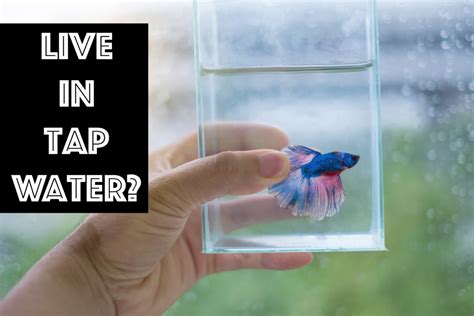The health and well-being of your betta fish depend on the quality of the water they swim in. Tap water, which is the most convenient and readily available water source for many aquarium owners, may not always be safe for betta fish. In this article, we will explore the reasons why tap water can be problematic for betta fish and what you can do to make it safe for your finned friends.
The Risks of Tap Water for Betta Fish
Tap water can contain a variety of substances that can harm your betta fish, including:
- Chlorine and chloramines: These disinfectants are commonly used to kill bacteria and other microorganisms in tap water. However, they can also damage the gills and skin of betta fish, leading to respiratory problems and other health issues.
- Heavy metals: Tap water can contain heavy metals like lead, mercury, and copper, which can be toxic to betta fish even in small amounts.
- pH levels: Tap water can have a high or low pH level, which can be stressful for betta fish. Betta fish prefer a pH range of 6.5-8.5, and sudden changes in pH can cause them to become sick or even die.
- Fluoride: Fluoride is added to many municipal water supplies to promote human dental health. However, it can be toxic to betta fish in high concentrations.
How to Make Tap Water Safe for Betta Fish
Fortunately, there are several steps you can take to make tap water safe for your betta fish:
- Use a water conditioner: A water conditioner can remove chlorine, chloramines, and heavy metals from tap water, making it safe for betta fish. You can purchase a water conditioner at most pet stores or online.
- Let the water sit: Allowing the tap water to sit for 24-48 hours can help to dissipate some of the chlorine and chloramines.
- Use a filter: A good filter can help to remove impurities and toxins from the tap water, making it safer for your betta fish.
- Test the water: Regularly test the tap water for pH, ammonia, nitrite, and nitrate levels to ensure that it is safe for your betta fish.

Water Conditioning Products for Betta Fish
There are many water conditioning products available on the market that can help to make tap water safe for betta fish. Some popular options include:
- API Tap Water Conditioner: This product removes chlorine, chloramines, and heavy metals from tap water and is safe for use in betta fish tanks.
- Seachem Prime: This product is a comprehensive water conditioner that removes chlorine, chloramines, and heavy metals, as well as ammonia, nitrite, and nitrate.
- Tetra AquaSafe: This product is a water conditioner that removes chlorine, chloramines, and heavy metals, and also helps to stabilize the pH level of the water.
DIY Water Conditioning for Betta Fish
If you don't want to purchase a commercial water conditioner, you can also make your own DIY water conditioner using the following ingredients:
- Vitamin C: This antioxidant can help to neutralize chlorine and chloramines in tap water.
- Sodium thiosulfate: This chemical can help to remove chlorine and chloramines from tap water.
However, please note that using a DIY water conditioner may not be as effective as using a commercial product, and it's always best to consult with a veterinarian or aquarium expert before attempting to make your own water conditioner.
Frequently Asked Questions
Can I use tap water directly from the faucet for my betta fish?
+No, it's not recommended to use tap water directly from the faucet for your betta fish. Tap water can contain chlorine, chloramines, and heavy metals that can harm your betta fish.
How often should I change the water in my betta fish tank?
+It's recommended to change 25-50% of the water in your betta fish tank every 1-2 weeks. This will help to keep the water clean and fresh for your betta fish.
Can I use a water conditioner and a filter together?
+Gallery of Tap Water Safety for Betta Fish






By following these tips and guidelines, you can help to ensure that the tap water you use for your betta fish is safe and healthy for them to thrive in. Remember to always test the water regularly and make adjustments as needed to keep your betta fish happy and healthy.
